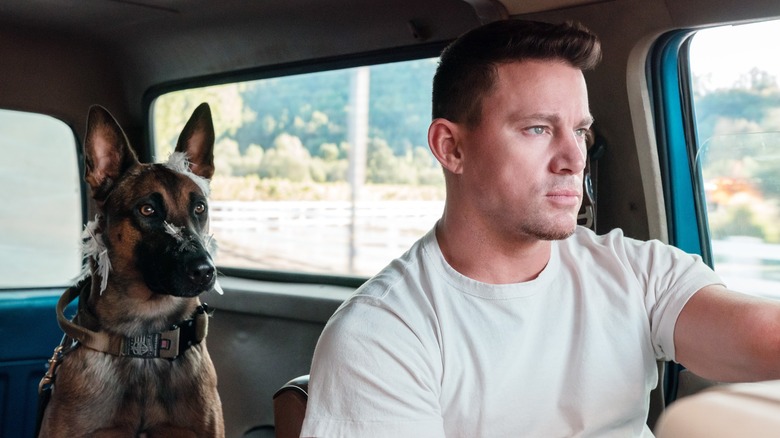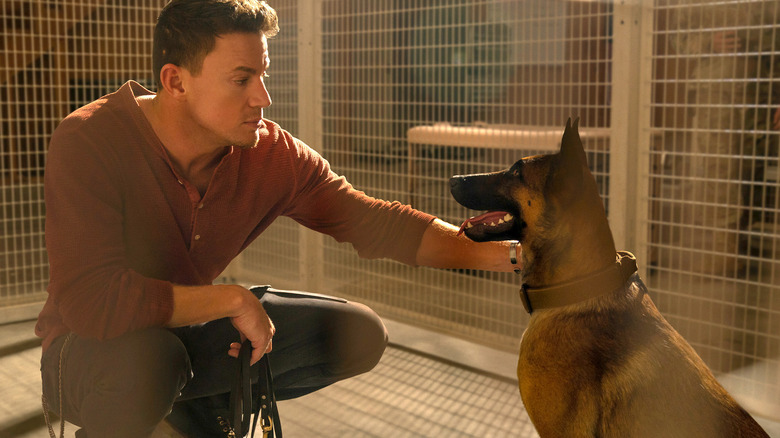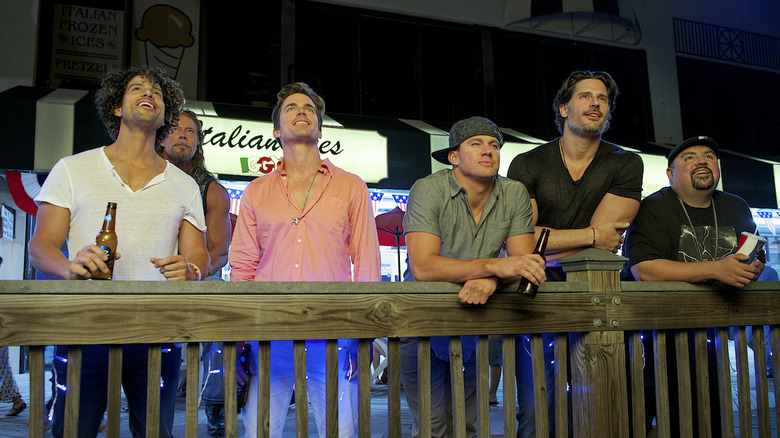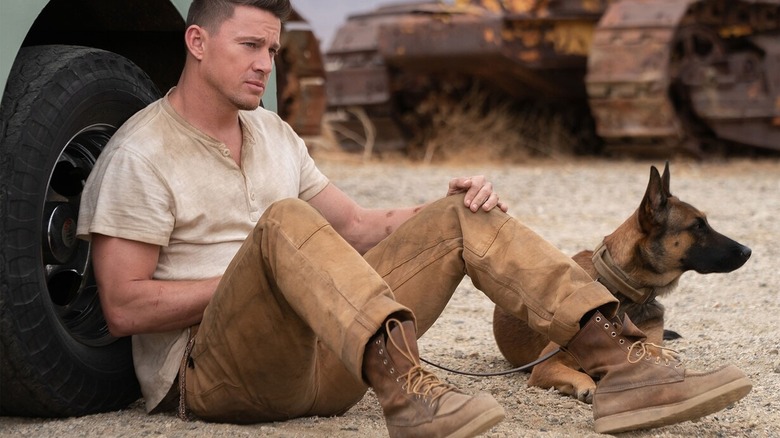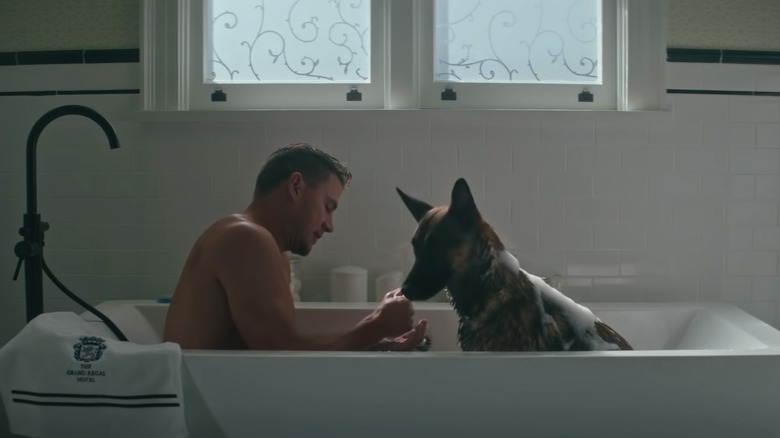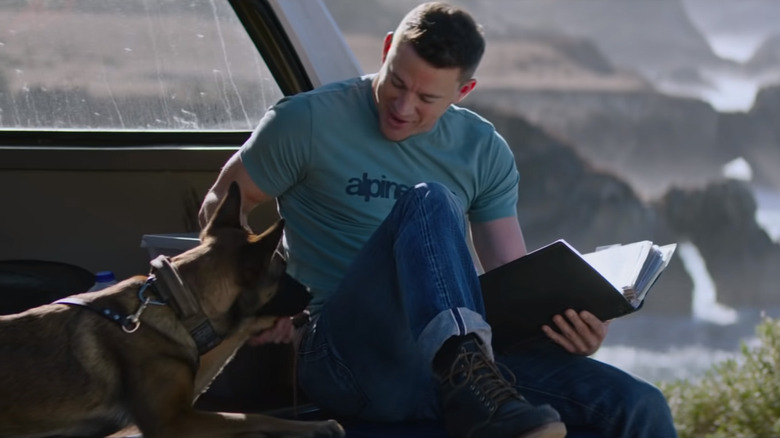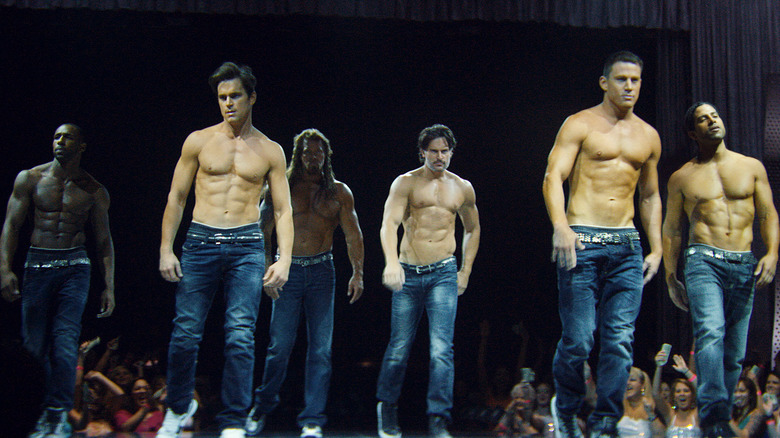Dog Director Reid Carolin Says Working With Animals Taught Him A Valuable Lesson [Interview]
Most movies about the military are kind of a bummer, and most movies about dogs aren't a whole lot better. Thankfully, "Dog" writer and co-director Reid Carolin, who shared the director's chair with star Channing Tatum, wasn't interested in making people feel bad. After several years of extended misery due to the pandemic, Carolin and Tatum figured a feel-good movie might be better for the masses.
Their directorial debut, "Dog," stars Tatum as Briggs, an army ranger put on indefinite leave after he's injured while deployed overseas. He wants to get back to work and begs for an assignment, and is told to drive his recently deceased best friend's service dog to the funeral, several thousand miles down the Pacific coast. Lulu served alongside Brigg's best friend in the Middle East, and it left her with some trauma and aggression, making Briggs' job especially difficult. Over the course of their journey, the two learn to appreciate one another, and a beautiful friendship is born.
I had the chance to sit down and chat with Reid over the phone, and asked him all about "Dog," working with Belgian Malinois, and of course, the upcoming "Magic Mike" sequel, which he penned. The heartwarming "Dog" is currently playing in theaters nationwide.
This interview has been lightly edited for clarity.
'The dogs opened up the emotional worlds of these guys'
Can you tell me a little bit about the origin of "Dog"? What inspired you and Tatum to make this movie?
Well a few things first, we made a documentary for HBO called "War Dog." That's about five years ago now I think and it exposed us to a world of Army Ranger dog handlers and their dogs. And we just thought this relationship that we saw between these super soldiers and their dogs was incredibly unexpected and emotional. The dogs opened up the emotional worlds of these guys who really kept themselves guarded as a prerequisite of their lives. A prerequisite of being able to survive in that job is to just kind of keep everything really buttoned up, and these dogs were able to show us these sides of them that we rarely got to see. It made them three-dimensional characters, and so we wanted to tell a story that sort of shined a light on who these guys are and how thin that line between human and animal really is.
We also had deep personal relationships with our dogs that inspired the film. Both Channing and I, a couple years ago after we stopped developing a film that we were going to direct when it fell apart, both of our dogs got cancer and my dog luckily is still with me. And his dog sort of went the other direction. So he took a road trip with her to say goodbye and when he came back it was just really emotional. And we just thought, I don't know what the movie's going to be, but this is making us feel something and we should explore this territory. And what we did is we tried to combine those things like our experiences and love for our own dogs and our magnetization to this world of Rangers and their dogs with something that we felt like people could go to the movie theaters and see and celebrate. And so we tried to make it a comedic road movie, like the kind of old school road comedies that we love that also had these deep themes sort of embedded underneath it.
'The scenery is changing, things are happening that you can't control'
I was going to say, you've written a couple of road trip movies now, including "Dog." What draws you towards the idea of a road trip for cinematic purposes?
Well, I just like road trips. I take a lot of them. I mean, all the time. I'm just in a car driving around somewhere, camping or finding some new place to go and explore. And I think that's just part of what I did growing up and it's one of the ways Channing and I connected is being on these trips. They force you to explore obviously new physical territory, but by doing so you oftentimes explore new territory in yourself because you're in the unknown. You're out fully present in the world and you're forced oftentimes into unexpected uncomfortable situations. So it's a great canvas to put a character on. The scenery is changing, things are happening that you can't control. So we just felt like that's just the right way to give people an access point to a world that can otherwise be tough to access. It can be either sad or dark or — you pick your adjective — small. And so the road aspect of things really opened up the movie and made it something I think you had to go see on a big screen.
'It was the most validating thing is knowing, okay, they're behind this'
It's interesting, the military aspect of the film you spoke about, how it was inspired by the documentary that you made. How did you set about making the military part feel so authentic? Because it does feel very true to life.
Oh, good. Well look, we had obviously the experience of making the documentary. So we got to know these guys. We became friends with them, the guys from our documentary and their dogs. And then they introduced us to more guys from their community. And we invited them all to consult on the film.
So they consulted on the script. They were with us for about a third of shooting. They brought their dogs, they road tripped across the country with their dogs and came to set and basically said do this, don't do that. He would say this. He wouldn't say that. And then they looked at the cuts of the movie and they were just with us on our USO tour, promoting the film. So it was really important to us from the very beginning to say what these guys have experienced matters. So what they say down to the last detail of what's on the wall of a scene, what a character would say, anything, they have full say on and we're going to listen.
And so I was really most nervous when we showed them the film and kind of most proud of their reaction to it. It was the most validating thing is knowing, okay, they're behind this. And we honored that partnership the whole way. So yeah, I think hopefully that's what comes through on screen is something that feels like it really represents the authentic experience of these guys.
'The plan isn't working, let's go left and let's not think about it.'
That's great. The old adage in Hollywood is that you should never work with kids or animals, but...
Yeah.
Belgian Malinois (the breed Lulu is) are almost their own special thing. What was it like directing these doggie co-stars?
I mean, it was a challenge. It was also great because you don't know what you don't know when you're making your first movie. So everybody around me was saying, this is the hardest movie I've ever made. And I was going, it's the only movie I've ever made! I mean, from a directing standpoint. So it's just, it is what it is.
You have to come into the day with a huge plan when you're working with dogs, it has to be very specific. You got to say, this is the shot. This is exactly the one thing that I want the dog to do in the shot. And then we'll only get a few takes at it and then you move on. But the issue is oftentimes the dogs just don't feel like doing the plan. And so you have to be able, when you have this very specific plan, to go, the plan is not working, let's now move into something that we'd never thought of before and do it instantly, and just sort of adapt and just see what happens to the story. So we just had to do a lot of it and that was fun.
It's actually, I think, a great way to create that I'll take with me into doing films that don't involve animals. Just being flexible to go, well, the plan isn't working, let's go left and let's not think about it. And it's a nice, liberating way to create.
'There's a version of this that could have been a Sundance movie'
And Tatum's been very frank about the movie's happy ending in interviews, which I think is great because he wants people to see the movie and not think it's going to be another "Marley and Me." What drew you guys towards telling a truly feel-good story?
It's tough to say. Look, Channing's dog died of cancer. And they went on a road trip to really say goodbye to each other. And it's a beautiful thing that happened to them. And when we first started creating this movie, we thought, well we have to sort of tell some story like that. And as we started writing it, we just found ourselves feeling so sad to sit down and write that. It just felt like writing the scenes just felt so sad and there's nothing wrong with it because there's a version of this that could have been a Sundance movie or an awards movie or something like that. And I think both of us just sort of sat down and felt like we just don't want to feel sad right now. It's not the way our dogs made us feel.
Most of our relationships with our dogs were just really fun times and that's what people want to see. And so I think we tried to tell a story that made us feel good as we were working on it, like we were going to a place that honored sort of the way we felt about our animals. And we really wanted to make sure we didn't make a sad soldier movie. We only want to make a movie about just people who were traumatized and broken at war. We wanted to make a movie that showed these guys as three dimensional characters who are heroes and bad asses and also wounded and also hilarious regular people. So a lot of that factored into it and I think it's a weird time for movies like this. Most of them tend to go to streaming services and whether they're seen or not, they're not propositions that tend to go on the big screen.
And so we thought from the very beginning we want a theatrical release for this, and it's not just that we want it to be in theaters — we want people to go see it. So what do you have to do, to do that? You have to make some form of populist entertainment. There was a time when people would flood to the theaters to see something like "Rain Man," and I'm not sure if they wouldn't do that today. Maybe they actually still would, but it's increasingly unlikely. And so we wanted to make sure that we had elements of the film that felt fun and accessible, warm ... something that would draw you into to the movie theaters.
'It's much different than the first two movies'
And my last question: can you tell me anything about the upcoming "Magic Mike" sequel?
Well I can tell you, as Channing likes to say, it's going to be the Super Bowl of stripping. I don't want to set the expectations too high, but I'm really excited about it. It's much different than the first two movies. Each movie is kind of its own genre, its own statement. This third one is much more like if you took "Pretty Woman" and merged it with "All That Jazz" or a Fred Astaire movie or something like that. I mean it's much different in tone. Central character is a woman, a really cool female character who, along with Mike, kind of creates the thrust of the movie that all takes place over in London. So I'm excited for people to see what we're up to. There'll be a lot to say over the coming weeks as we start shooting. Cause we start in about two weeks.
Awesome. Well, thank you so, so much. Actually, "Magic Mike XXL" is one of my favorite movies of all time. I think it's a masterpiece.
Oh God bless you. Thank you so much. I appreciate it. I got to tell you I have such a soft spot for that film. And it's not like you never know how movie's going to be received, but we got to make the first movie and we thought we were making "Saturday Night Fever" and everybody went oh, this is girls' night out at the movies. And so for the second one we were like, let's just do something totally different and strange. And the themes of it became so kind of important to me. And they're part of what made us make this live show and really what we're doing in the third movie is continuing that sort of conversation. So I always wish that people received the movie a little bit better because when I watch it I feel so good about what we did. So I'm glad you liked it.
"Dog" is now in theaters.
